History
Major milestones in the history of our organization from its inception to the present.
2000
Hibiya Park concert and food drive
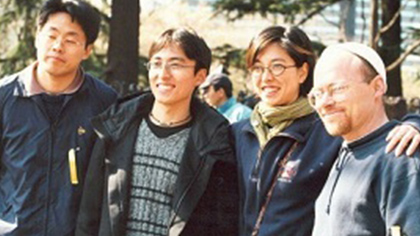
In January 2000, representatives from unions, and religious groups, as well as activists, involved in Sanya (Taito-ku, Tokyo) to discuss collaborating to collect food. Charles McJilton was made co-representative and the loose coalition was eventuall called, “フードバンク/Food Bank Japan”
2002
Activities begin under the name “NPO Food Boat Japan”
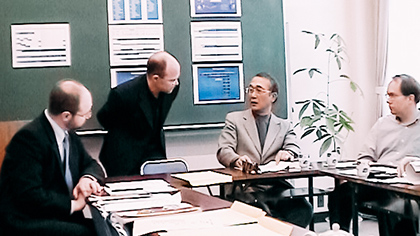
On March 11, 2002, we held our founding meeting at the Center for Christian Studies at Sophia University. On July 25 that same year the Tokyo Metropolitan Government officially granted us NPO legal status. At that time we operated without a warehouse and had to completely distribute what we had on the day.
2003
Regular PAB meetings begin
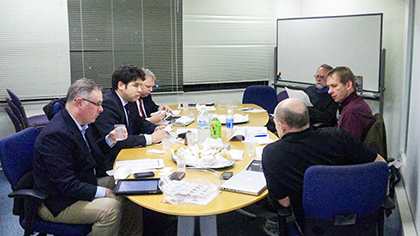
Established the Professional Advisory Board (PAB) to provide guidance and business advice. The PAB played a pivotal role in creating further developing our business plan which was first created in the summer of 2001. They also created metrics based on food banking standards in the US and other countries.
Asakusabashi, Tokyo office opens
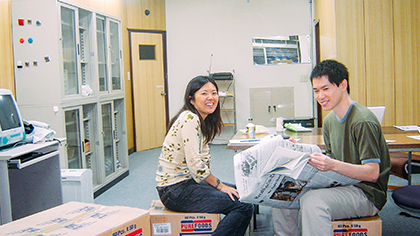
In July 2003, we moved our offices to the Mizuta Building in Asakusabashi, Tokyo.
2004
Officially change name to, "Second Harvest Japan"
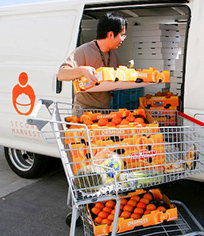
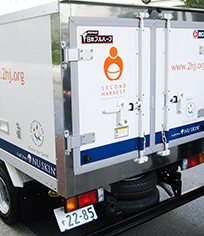
When we incorporated in 2002 we chose, 特定非営利活動法人フードボート NPO Food Bank Japan. However, it became clear there was confusion with the coaltion. With Beacon Japan's assistance we changed our name to simply, "Second Harvest Japan" and adopted the rice man logo. We intentionally do not use NPO in our name to reflect professional practices outside of Japan.
Food pantry opens
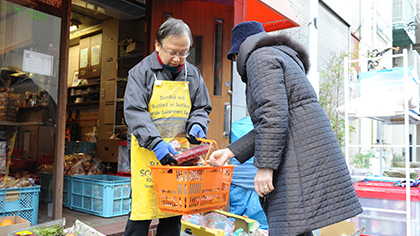
Began providing direct support and delivery of food packages.
Adopt-a-Family Project begins
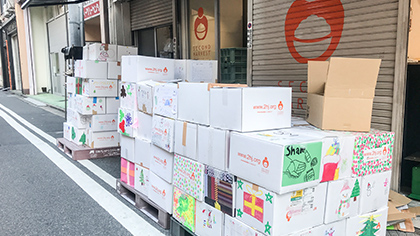
"Adopt-a-Family" is an opportunity for participating companies, groups, and organizations to directly suport a family during the holiday season and summer vacation when budgets are tighter because children no longer have school lunches to rely on.
2007
TV Tokyo's "Gaia no Yoake (Dawn of Gaia)" introduces Second Harvest Japan
This national broadcast became a turning point for us. Many companies saw that Nichirei Foods was donated and contacted us, "If they are donating with no problems then it must be safe."
Begin FAB meetings for current and potential food donors.
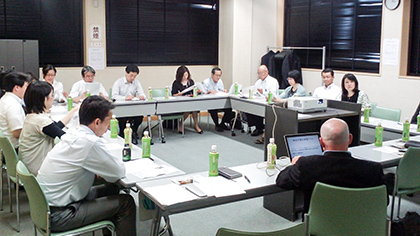
Due to the overwhelming response from the TV program we started informational meetings. This led to the creation of the Food Advisory Board (FAB). These meetings are an opportunity to exchange opinions on food banks from the perspective of food-related companies.
2008
National Food Bank Caravan Need for food bank guidelines presentation at the 1st Food Bank Symposium
2009
National Food Bank Caravan Presentatiion of the first draft of food bank guidelines at the 2nd Food Bank Symposium
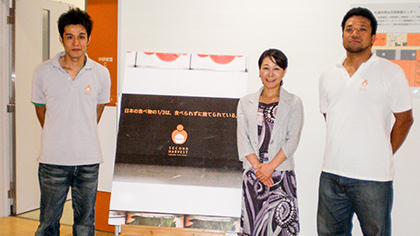
2010
Second Harvest Asia
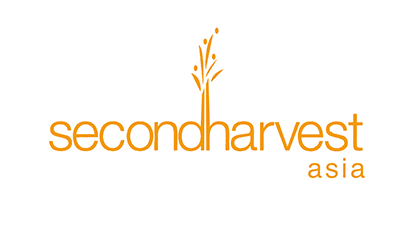
It was voted to establish a US nonprofit to assist in the promotion of food banking in Asia. This 501(c)3 is registed in Minnesota.
Food Bank activities in Japan reach ten-year milestone
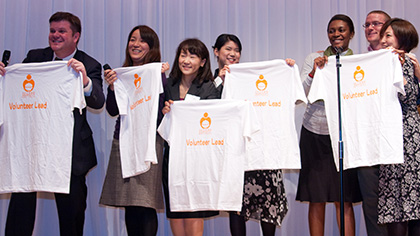
This year marked the 10th anniversary of the start of food bank activities in Japan. We invited and thanked all the companies, welfare facilities, organizations, and volunteers who have supported our activities.
Food Bank Guidelines ratified
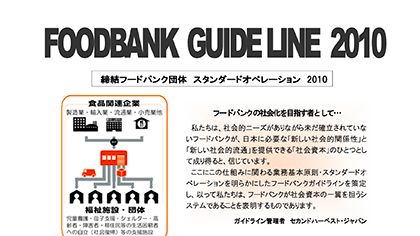
As the first food bank in Japan to draft food bank guidelines for sustainable food bank operations, 11 food banks in Japan signed the Food Bank Guidelines 2010 in October 2010.
2011
Great East Japan Earthquake
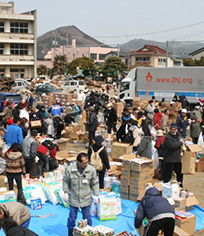
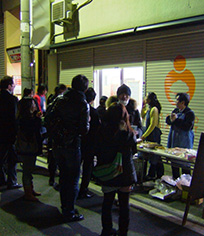
March 11, 2011, 14:46 the first of three disasters struck. By that evening we were delivering hot soup to those stranded in Tokyo and walking home. Within 48 hours we were enroute to the disaster area.
We made more than 170 trips to the affected areas to provide food to evacuation centers, children's homes, elderly care facilities, hotels, and cooperating NPOs. In addition, a local office was set up in Ishinomaki City to provide food assistance to disaster victims, and more than 10,000 food packages were sent from the Tokyo headquarters to disaster areas other than Ishinomaki City.
2012
Food Bank Symposium workshop held
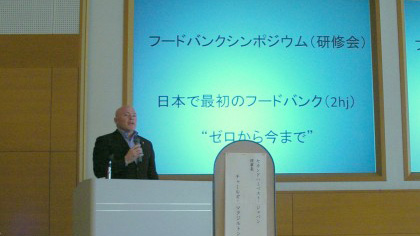
March 15, 2012, A training workshop (symposium) titled "Food Banks: From Zero to Now" was held in four locations across Japan. We discussed the current status and future vision of food bank activities in Japan.
Food Bank Promotion Project with the Ministry of Agriculture, Forestry and Fisheries
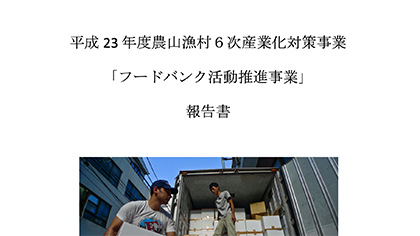
January - November 2012, As a part of the project for the 6th industrialization of agricultural, mountainous, and fishing villages under the 2011 Support Project for Environmental Measures of Food Industry, we received a subsidy from the Ministry of Agriculture, Forestry and Fisheries of Japan. The "Food Bank Activity Promotion Project" was carried out.
Delivery record system using QR codes begins
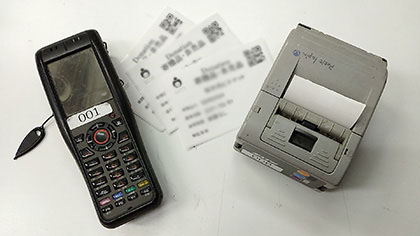
To improve the efficiency of recording the delivery of donated food products, and to record the traceability of the food products, the company introduced this system. The system also allows for the output of various reports, such as the number of deliveries per region, the amount of food supplied to each type of facility, and the utilization rate of vehicles
Enhanced CRM with companies
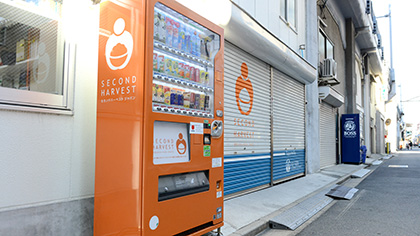
CRM (Cause Related Marketing) is a marketing activity that raises operating profit by linking a company's brand/service to various social issues and providing economic and human support. We were an early adopter to put this into practice by installing branded beverage vending machines.
2013
Second Harvest Japan appears in Japanese high school English textbooks
Charles McJiltong and our organization was featured in the 2013 edition of Sanseido English textbook that introduced the concept of food banking.
Supported recovery efforts for the aftermath of Typhoon Hayan in the Philippines
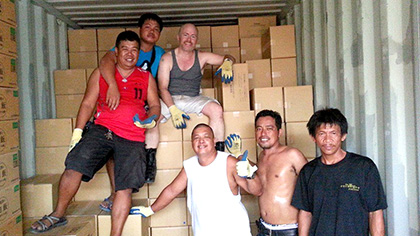
Relief supplies arrived in Cebu and Leyte, Philippines, based on information gathered by Charles during his field visits. Volunteers worked with us to load containers of aid.
2014
Received the Director-General's Food Industry "Mottainai Award" grand prize
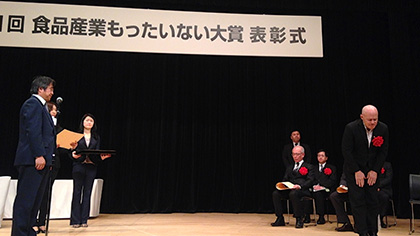
March 26, 2014: The first Food Industry Mottainai Awards ceremony, sponsored by the Ministry of Agriculture, Forestry and Fisheries, was held at Iino Hall in Uchisaiwaicho. We received the Director-General's Award.
2015
Matching Seminar hosted by Tokyo Metropolitan Government Bureau of Environment
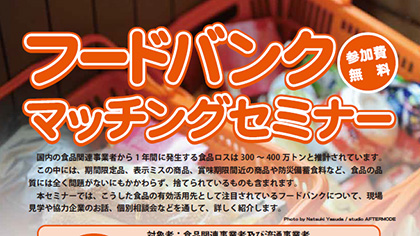
February 4, 2015, The Tokyo Metropolitan Government's Bureau of Environment hosted a matching seminar to connect companies interested in donating unneeded food with food banks. We gave a lecture and introduced our activities to visitors.
Kanagawa warehouse began operations
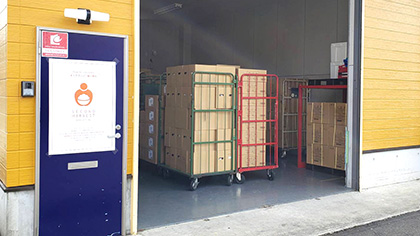
August 4, 2015, To strengthen food bank activities in Kanagawa Prefecture, the company rented a warehouse in Yamato City and began accepting donated food products.
Food Bank Operations Manual prepared and training sessions held in various locations
Commissioned by the Ministry of Agriculture, Forestry and Fisheries (MAFF) to improve the credibility of food banks and promote the development of an operational system for food bank groups, we prepared a detailed operational manual covering everything from setting up a food bank group to actual operations such as food management, and held workshops in Tokyo, Kagoshima, Osaka and Sendai.
2016
Food Bank Operations Manual Completed and Released
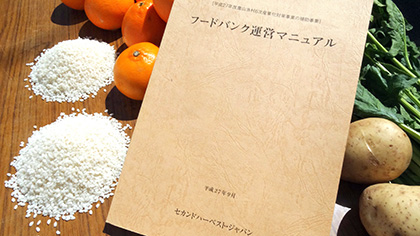
As part of a project by the Ministry of Agriculture, Forestry and Fisheries (MAFF) to reduce food loss, 2hj has accepted a project to disseminate a food bank operation manual.
Supported recovery efforts for the aftermath of the Kumamoto Earthquake
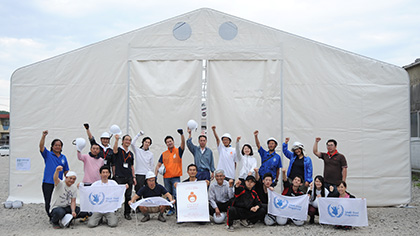
In response to a request for assistance from the Kumamoto Prefectural Government through Food Bank Kagoshima, we left Tokyo on April 16, the day of the main earthquake, in a 4-ton truck loaded with relief supplies, mainly disaster-stored food, and entered the area on April 17 to begin relief activities.
Initially, we were engaged in providing supplies to municipalities and transporting relief goods in response to requests from the prefectural government. However, due to the extent of the damage caused by the earthquake and the inability of official relief efforts alone to provide sufficient support to the victims, it was decided that long-term support was necessary and the Kumamoto Project was launched to work in the area until the end of 2016.
Second Harvest Japan introduced in the morning edition of the Asahi Shimbun on August 18th and September 5th
With the start of the Self-Reliance Support System for the Needy in April 2015 and the establishment of support offices by local governments, new food banks have been launched and an increasing number of food banks are cooperating with local governments.
Second Harvest Japan enters a new stage with the opening of Harvest Central Kitchen
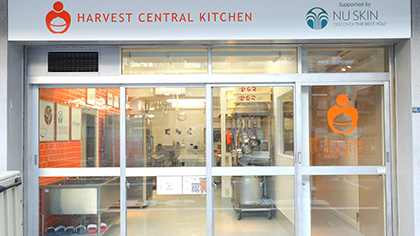
October 5, 2016, Opened with the goal of providing approximately 700 meals per week to learning support facilities and facilities for the needy. At the same time, a food business license was obtained to ensure that industry standards for food production were met.
Introduction of online matching system
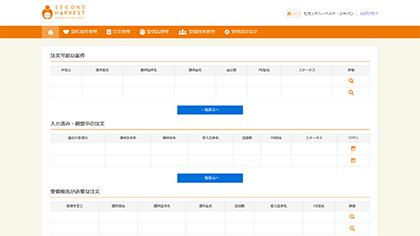
A closed platform limited to organizations supported by us. Food will be shipped directly from the donor company and can be applied for and received from anywhere in the country.
Number of companies and organizations providing food exceeded 1,000
2017
Official launch of "Tokyo2020: Food for 100,000" and we establish a warehouse in Yashio City, Saitama Prefecture.
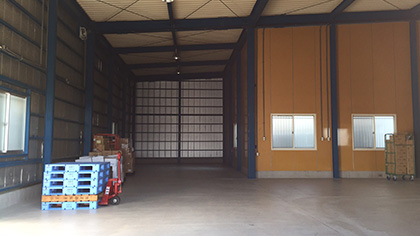
To suport "Tokyo2020: Food for 100,000" we contracted warehouse space at the end of 2016. This facility was large enough to accommodate our logisitc needs.
Kids Café opens
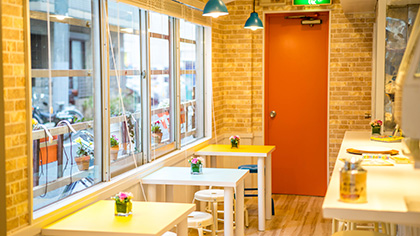
March 28, 2017, Kids Café was officially opened to provide a place for children accompanying parents picking up food at our pantry. It was also used after school programs for children in the community. Unfortunately, due to the pandemic operations stopped in April 2020.
Kids Café
15th Anniversary Party
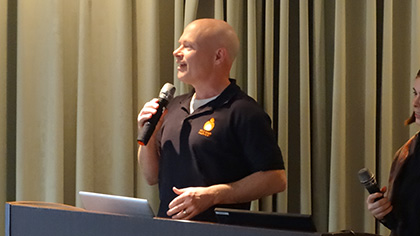
On April 16, 2017, we celebrated our 15th anniversary since our incorporation. We held a commemorative event with companies, organizations, volunteers, and also alumni who have supported us in the past. Charles remarked that the 15-year history of the organization was built on trust and equality with many stakeholders.
10th Food Bank Symposium
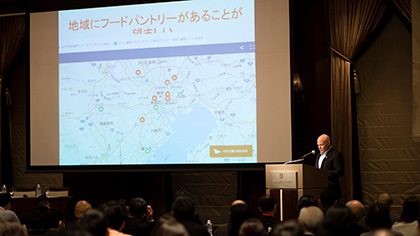
October 16, 2017, The annual symposium publicly solicited ideas for building a food safety-net along with case studies from companies and organizations. At the end was a panel discussion with experts. The theme of the symposium was, "A society where people have a place to turn to when they are in need of food."
2018
Second Harvest Japan receives accreditation as a "Certified Non-Profit Organization"
On April 11, 2008, we were accredited as a certified non-profit organization by the Tokyo Metropolitan Government. Upon receiving accreditation, donations were now eligible for tax benefits.
CEO Charles presents "marugohan" at Expo2020 Dubai: EXPOLIVE

ExpoLive is a special program created by Expo2020 Dubai to promote social innovation to tackle social issues. Over 11,000 projects applied for funding and only 125 were selected. Our project, marugohan, was one those selected.
Disaster relief for severe flooding in Western Japan
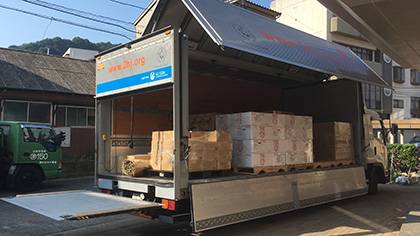
Activities began immediately after the occurrence of the torrential rain disaster in western Japan in July 2018. In response to requests from local governments and organizations engaged in support activities in the affected areas, we provided food, beverages, and other relief supplies to evacuation centers and other locations. From October, we shifted to medium- to long-term food support to help homebound evacuees rebuild their lives. In collaboration with organizations that continue support activities in the area, we ascertained the situation and needs of homebound evacuees and coordinated with the relevant departments in charge.
2019
Provided assistance to victims of Typhoon No. 19
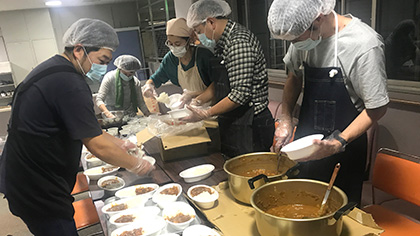
With the cooperation of Saitama Prefecture's Welfare Department, we began working with the Kawagoe City Council of Social Welfare to provide hot meals to those who had evacuated to facilities in the city. We also entered Tochigi Prefecture to provide support, working with Food Bank Utsunomiya and the Tochigi City Council of Social Welfare to provide food assistance to disaster victims. Food packages were also provided to the support project for visiting disaster victims conducted by Tochigi City and the Tochigi City Council of Social Welfare.
"Marugohan," a completely new style of food pantry, fully underway
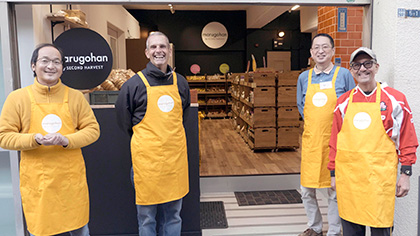
In October 2019, marugohan, a completely new style of pantry, was launched to provide a more comfortable and user-friendly pantry service to users who need assistance with food.
2020
Full-scale launch of emergency support from Seiyu, LLC to assist rapidly increasing number of users due to the COVID-19 pandemic
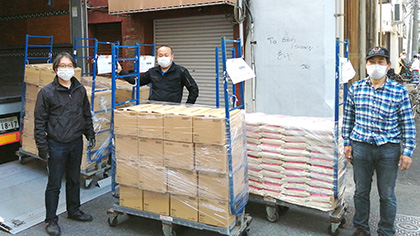
Since 2009, Seiyu's support has been provided in a variety of ways, including not only food donations through food banks and food drives, but also grants, employee participation in volunteer activities, in-store cash register donations by customers and matching donations. (As of September 2020)
Distribution method at directly-managed pantries changes to an emergency system due to the issuance of the first state of emergency declaration
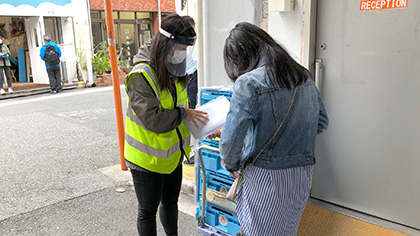
Following the issuance of the first emergency declaration, the distribution method was changed on April 16. After taking thorough measures to prevent the spread of COVID-19, the style of distribution was changed from one in which each person could choose according to his/her needs to one in which pre-set packages were given to each person. In order to avoid any confusion, the decision was made to suspend the Kids Cafe until the situation was resolved.
Fully-revamped donation management system becomes fully operational
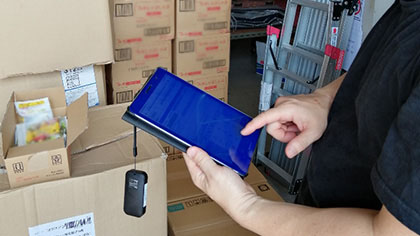
In order to strengthen the food lifeline, the donation management system has been completely renewed, and full-scale operations began on August 1, 2010. Preparations for the introduction of this system began in April 2020, and the system was designed to save labor in current operations, improve the accuracy of data management, and strengthen the system environment, while also taking into consideration current COVID-19 situation.
COVID-19 pandemic expands food safety net. Directly managed and linked food pantries exceed 40 in both Tokyo and Saitama.
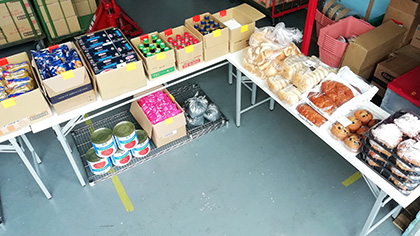
As of the end of October 2020, the number ofj directly managed and affiliated pantry locations in Tokyo reached 40. In Saitama Prefecture, the number had already surpassed 40 locations as of the end of August 2020, and as of the end of October 2020, 47 locations, far exceeding the target.
Emergency pantry for college students in need due to COVID
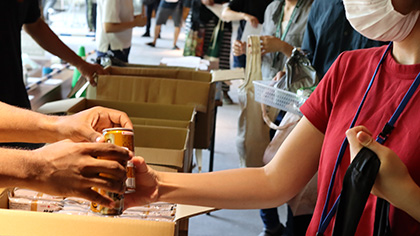
In cooperation with Tokyo University of Agriculture, an emergency food pantry was held on the university's campus for two days in July and August for students in need. The students who received the food expressed their gratitude for the pantry and the difficult situation they were in. In addition, we also collaborated with various educational institutions such as universities, junior colleges, vocational schools, and Japanese language schools to provide support for the increasing number of needy students.
"Usagamisore Project" established
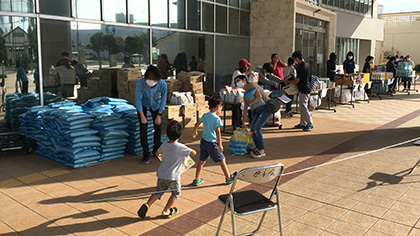
In Okinawa, where the poverty rate has exceeded 30% due to the COVID-19 disaster, the Usagamisore Project is being implemented. The project will provide assistance to a total of 10,000 households from July to December 2020. In December 2020 in a six-day period 10,000 households were served.
2021
Second Harvest Japan receives the 55th Eiji Yoshikawa Cultural Award
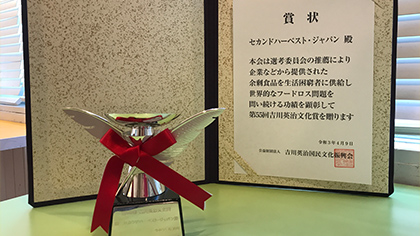
The first food bank in Japan to be recognized for its long-standing activities of redistributing surplus food and other items to organizations, groups, and individuals in need of food assistance in collaboration with various stakeholders.
Usagamisore Project to provide food with 30,000 households in Okinawa
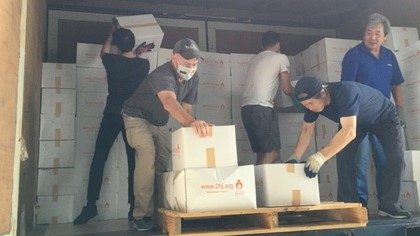
Since July 2020, 2HJ has been implementing the Usagamisore Project in collaboration with various stakeholders including Barclays Group in Okinawa. A total of 30,000 households in need of food assistance had been provided food by the end of August 2021.
Established a total of 200 pantries including 2HJ own pantries and food pantry partners in Tokyo, Kanagawa and Saitama with “Tokyo 2020: Food for 100,000
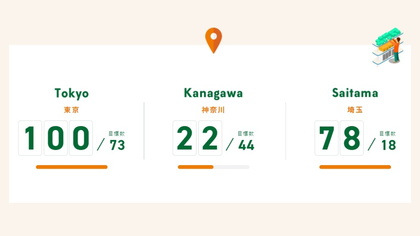
Since 2016, “Tokyo 2020: Food for 100,000” has been implemented to provide food to 100,000 people in Tokyo and a total of 160,000 people including Kanagawa and Saitama. As of the end of December 2021, data showed that 100 pantries were established in Tokyo, 78 in Saitama, and although the target number was not reached in Kanagawa, a total of 200 pantries were established against the target of 135.
2022
Initiated Food bank activities outside the Kanto region through collaboration with local companies and organizations
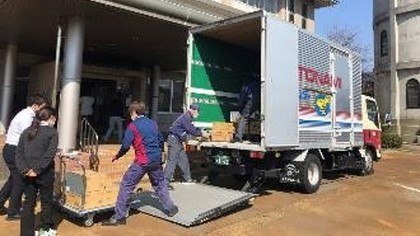
On March 12, 2022, With TONAMI Transportation, headquartered in Takaoka City, Toyama, the Takaoka City Social Welfare Council and the local government, 2HJ provided food assistance to 60 households with underage children in need who are members of the Takaoka City Single-Parent Support Welfare Association. TONAMI Transportation provided its drivers and vehicles for the transportation of food from 2HJ Saitama base to the pantry venue in Takaoka City.
2023
Second Harvest Japan appoints New CEO
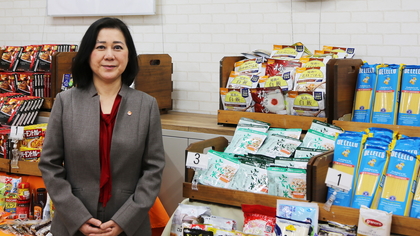
Hitomi Yokote has been appointed as 2HJ's new CEO, effective July 1, 2023.
A food pantry in collaboration with a local organization in Okinawa
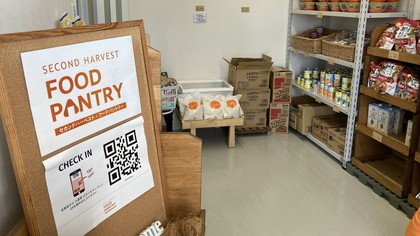
In November 2023, 2HJ opened 'Second Harvest Food Pantry' in Tomigusuku City, Okinawa, in collaboration with Food Bank Second Harvest Okinawa. In Okinawa, where the need for food support remains consistently high, we aim to establish a food pantry that allows people to receive food when needed, unlike the previous distribution events that were short-term and one-off.
2024
Support for areas affected by the Noto Peninsula Earthquake
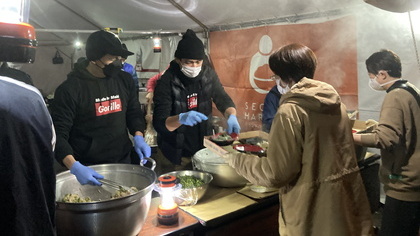
2HJ has worked with disaster relief and local organizations immediately after the earthquake occurred in January, 2024, and conducted soup kitchens and delivered food that meets the needs of disaster victims. 2HJ also opened its Nakanoto base to provide mid-term support with disaster victims including those who are evacuees in their homes.
Nakanoto base to provide Mid-term support to disaster-stricken areas in Ishikawa
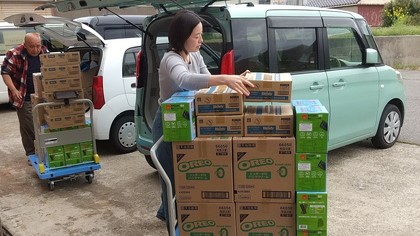
In March 2024, 2HJ established its Nakanoto base in Nakanoto-cho, Kashima, Ishikawa, to provide mid-term support to areas affected by the Noto Peninsula earthquake. 2HJ continues to collaborate with disaster relief and local organizations as they did in emergency assistance.
Free Food Package Project to support victims in disaster-stricken area of Noto
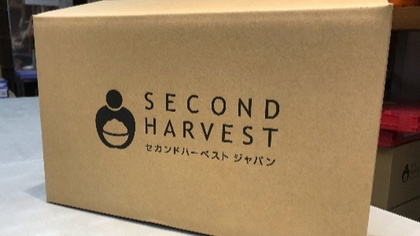
In October 2024, 2HJ started providing Free Food Packages of around 10kg with various food items to households living in temporary housing, rented housing, and those who continue to evacuate at home who are worried about the financial aspects of rebuilding their lives amidst difficult evacuation situations.
The 2nd Second Harvest Food Pantry in Naha to Open
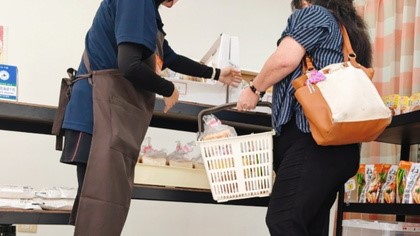
In December 2024, the 2nd Second Harvest Food Pantry, which operates in collaboration with Food Bank Second Harvest Okinawa, opened in Naha. Like the Tomigusuku store opened in November 2023, it adopts a shopping style that allows each user to choose what they need, and the new store provide food assistance twice a week on Mondays and Wednesdays to meet larger needs in Naha.
2025
Food donations through the new disaster relief scheme of SEIDANREN
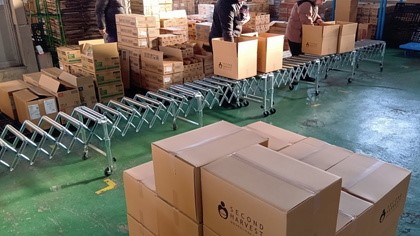
The new disaster support scheme of the National Life Industry and Consumer Organization Federation (SEIDANREN) is organized as a coalition of over 700 companies, consumer organizations and NPOs, aimed at establishing a cooperative structure within the organization for effective disaster support. Starting from January 2025, more than 20,000 donated food items from a total of 8 member companies have delivered to the 2HJ Nakanoto base as the first large-scale case under this scheme.
Second Harvest Japan appoints Yuji Shibata as new CEO
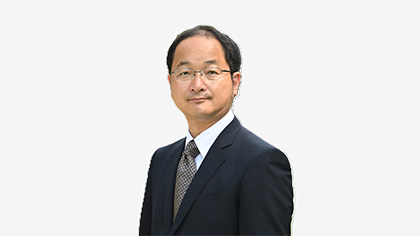
Yuji Shibata has been appointed as 2HJ's new CEO, effective July 1, 2025.
